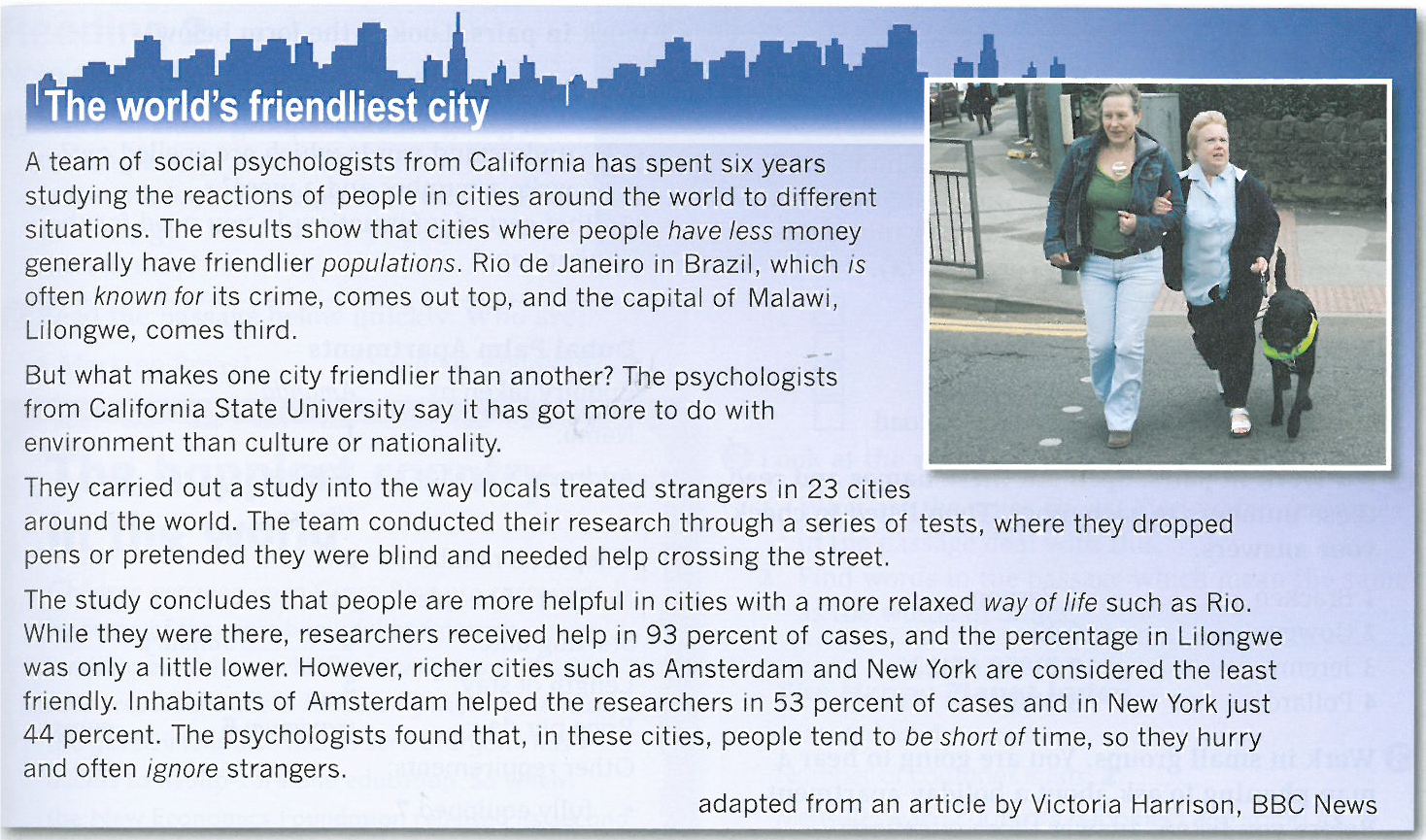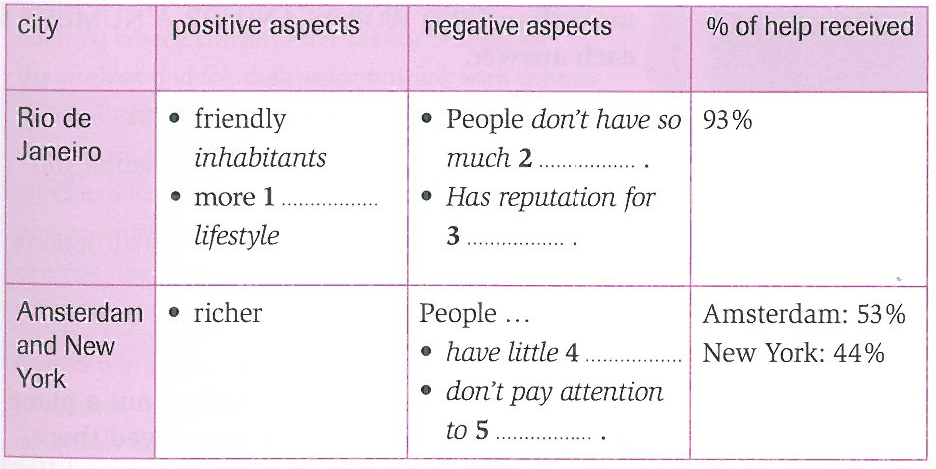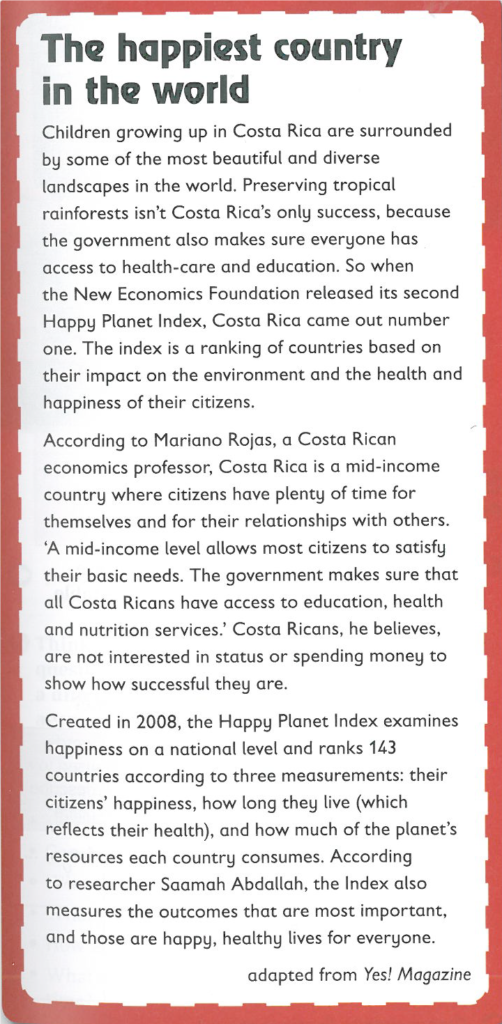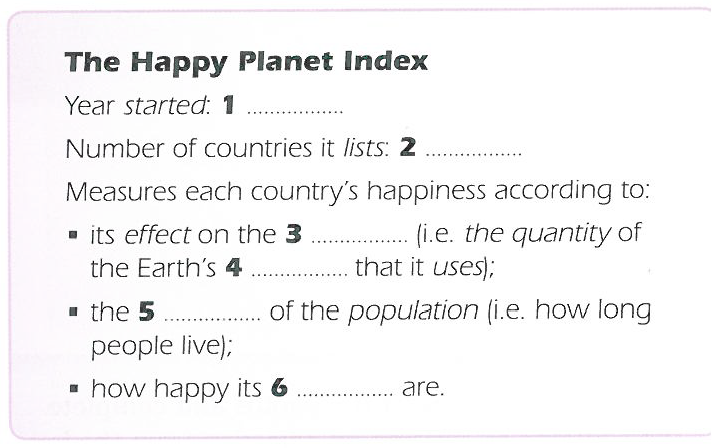READING EXERCISES ABOUT CULTURE
EXERCISE 1: (from Complete IELTS bands 4-5)


EXERCISE 2:

Complete the note below with ONE WORD from the reading passage for each blank.

EXERCISE 3: Just read to know more about culture shock
Sometimes work, study or a sense of adventure (cảm giác thích phiêu lưu) take us out of our familiar surroundings (môi trường xung quanh) to go and live in a different culture. The experience can be difficult, even shocking.
Almost everyone who studies, lives or works abroad has problems adjusting (điều chỉnh) to a new culture. This response (sự phản ứng, đáp lại) is commonly referred to as ‘culture shock’. Culture shock can be defined (định nghĩa) as ‘the physical (thuộc thể chất) and emotional (thuộc tình cảm) discomfort (sự khó chịu) a person experiences when entering a culture different from their own’ (Weaver, 1993).
For people moving to Australia, Price (2001) has identified (xác định) certain values which may give rise to (làm tăng) culture shock. Firstly, he argues that Australians place a high value on independence and personal choice. This means that a teacher or course tutor (gia sư) will not tell students what to do, but will give them a number of options and suggest they work out which one is the best in their circumstances. (hoàn cảnh) It also means that they are expected to take action if something goes wrong and seek out resources and support for themselves.
Australians are also prepared to accept a range of opinions rather than believing there is one truth. This means that in an educational setting, (môi trường) students will be expected to form their own opinions (hình thành quan điểm , ý kiến) and defend the reasons for that point of view and the evidence for it.
Price also comments that Australians are uncomfortable with differences in status (địa vị) and hence (adv. vì vậy) idealise t(lý tưởng hóa) he idea of treating everyone equally (1 cách bằng nhau). An illustration (sự mô tả) of this is that most adult Australians call each other by their first names. This concern with equality means that Australians are uncomfortable taking anything too seriously and are even ready to joke (nói đùa) about themselves.
Australians believe that life should have a balance between work and leisure time. As a consequence (vì vậy), some students may be critical of (phê bình) others who they perceive (thấy, nhận định) as doing nothing but study.
Australian notions of privacy mean that areas such as financial matters ( vấn đề thuộc về tài chính), appearance (diện mạo bề ngoài) and relationships are only discussed with close friends. While people may volunteer such information, they may resent (không ưa) someone actually asking them unless the friendship is firmly established (được thiết lập 1 cách chắn chắn). Even then, it is considered very impolite to ask someone what they earn. With older people, it is also rude (thô lỗ) to ask how old they are, why they are not married or why they do not have children. It is also impolite to ask people how much they have paid for something, unless there is a very good reason for asking.
Kohls (1996) describes culture shock as a process of change marked by four basic stages. During the first stage, the new arrival (người mới đến) is excited to be in a new place, so this is often referred to as the “honeymoon” stage. Like a tourist, they are intrigued by (bị hấp dẫn bởi) all the new sights and sounds, new smells and tastes of their surroundings. They may have some problems, but usually they accept them as just part of the novelty (điều mới mẻ). At this point, it is the similarities that stand out, and it seems to the newcomer (người mới tới) that people everywhere and their way of life are very much alike. This period of euphoria (hạnh phúc tột độ) may last from a couple of weeks to a month, but the letdown (sự hụt hẫng, thất vọng) is inevitable.(không thể tránh khỏi)
During the second stage, known as the ‘rejection’ stage, the newcomer starts to experience difficulties due to the differences between the new culture and the way they were accustomed to (được làm quen với) living. The initial (ban đầu) enthusiasm (sự nhiệt tình) turns into irritation (chuyển thành bực dọc), frustration, (bực bội = irritation) anger and depression (sự trầm cảm), and these feelings may have the effect of people rejecting the new culture so that they notice only the things that cause them trouble, which they then complain about. In addition, they may feel homesick, bored, withdrawn (thu mình lại) and irritable (ngứa gan, bực mình) during this period as well.
Fortunately, most people gradually learn to adapt to the new culture and move on to the third stage, known as ‘adjustment and reorientation’. During this stage a transition occurs to a new optimistic attitude. As the newcomer begins to understand more of the new culture, they are able to interpret (phiên dịch ra) some of the subtle cultural clues (các chứng cứ văn hóa tinh tế) which passed by unnoticed (trải qua rồi mà không biết) earlier. Now things make more sense and the culture seems more familiar. As a result, they begin to develop problem-solving skills, and feelings of disorientation (lạc phương hướng) and anxiety no longer affect them.
In Kohls’s model, in the fourth stage, newcomers undergo (trải qua) a process of adaptation (sự thích nghi). They have settled into (ổn định) the new culture, and this results in a feeling of direction (phương hướng) and self-confidence. They have accepted the new food, drinks, habits and customs and may even find themselves enjoying some of the very customs (phong tục tập quán) that bothered (làm phiền) them so much previously. In addition, they realise that the new culture has good and bad things to offer and that no way is really better than another, just different.
Learn the main vocabulary in the reading about Australian culture and culture shock here: https://quizlet.com/_787k3p?x=1jqt&i=1f7d5e
Following are listening exercises about the topic of culture, nghe mỗi ngày 1 bài nhé các em (trả lời câu hỏi, học vocab đi kèm, nghe đọc theo script, bạn nào thấy khó quá thì đảo trình tự lại thành học vocab, nghe đọc theo script rồi mới nghe trả lời câu hỏi nhé => mục tiêu là hiểu biết thêm về văn hóa các nước chứ chẳng phải học hành cao siêu, luyện kĩ năng gì cả đâu) :
- http://www.elllo.org/english/Step/T019English.htm
- http://www.elllo.org/english/0801/T821-Michele-Culture.htm
- http://www.elllo.org/english/0001/006-Reiko-Japan.htm
- http://www.elllo.org/english/0551/571-Rina-TwoCultures.html
- http://www.elllo.org/english/1201/1243-Felipe-Cultures.htm
- http://www.elllo.org/english/0251/283-Jeff-India.htm
- http://www.elllo.org/english/0501/513-Carla-Butsudan.html
